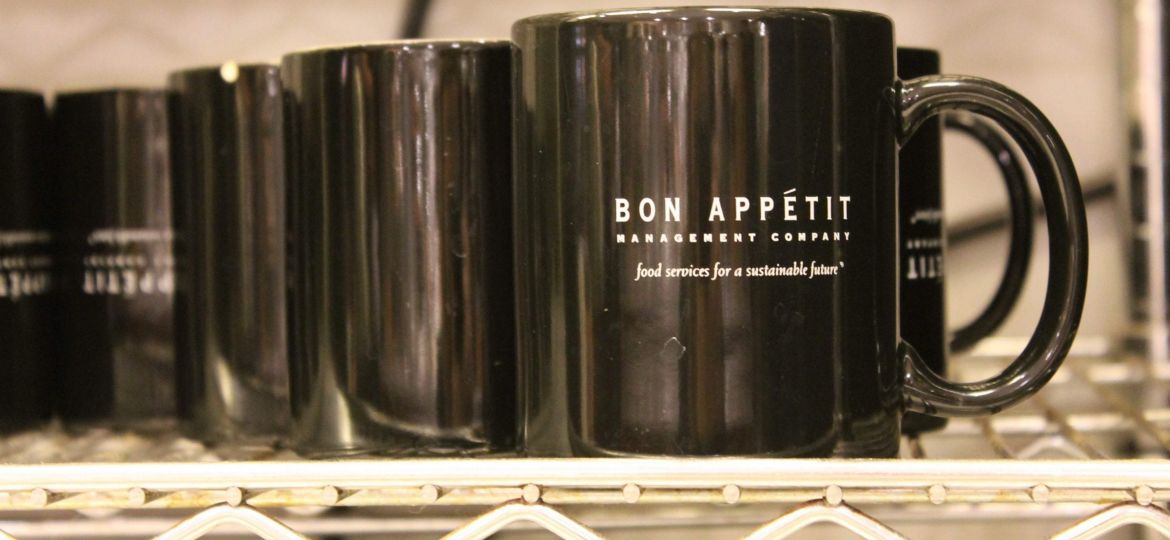
On Wednesday, Nov. 20, Bon Appetit Board Manager Randy Clay sent a campus-wide email imploring students to return missing mugs to Stav Hall. He pointed out that the cost of purchasing more mugs falls on students.
“I believe people are generally well-intentioned when they walk out of Stav with a mug. It takes no effort to walk out with a mug. It will now take a concerted effort to get those mugs back,” Clay wrote.
Stolen dinnerware has always been a problem for Stav. However, this year Clay is changing his outlook on the issue.
“I’m trying not to see it as theft because that approach hasn’t helped us reclaim any of the missing dishes,” Clay said. Instead, his strategy is to state the plain facts about missing Stav equipment and hopefully motivate students to do the right thing.
As Clay stated in his email to the student body last week, Stav started out with 1,000 new black mugs in October. More than 900 of these have since disappeared. An original inventory of 300 white mugs has dwindled to 30.
Bon Appetit acquired the black mugs, which cost $0.30 more than their smaller white counterparts, because another college had ordered them in blue and erroneously received a shipment in black. This allowed the company to purchase them at a discount. However, Bon Appetit staff quickly learned that having higher quality logoed mugs increased incentive for theft.
Students ultimately pay for these items through increased meal plan prices. Clay likens the problem to people not taking responsibility for environmental sustainability: When individuals are selfish, it hurts everyone.
“There are definitely groups on campus concerned about the environment, but unfortunately there are also a lot of students who don’t care. I don’t think people with that attitude are thinking sustainably,” Clay said. “A coffee mug or a plate shouldn’t be seen as something that’s disposable.”
According to Bon Appetit General Manager Peter Abrahamson, missing mugs cause problems during Christmas Festival season in particular. He noted that equipment shortages can make a bad impression on cash-paying guests.
“Guests will come in and see that we don’t have enough mugs, and we might have to put out disposable paper cups instead,” Abrahamson said.
However, missing dinnerware’s effect on the cost of food and services in Stav is not as straightforward as many students believe. A number of factors contribute to the company’s yearly budget forecast, including inflation and spending estimates. Bon Appetit presents this forecast to the college to determine the rate students will be charged the following year.
“There’s a misconception about meal plans and how they work, from [Bon Appetit’s] perspective,” Clay said. “They’re not based on 100 percent participation; they’re based on a missed meal factor.”
Abrahamson elaborated, “When we build the budget for each week, we estimate the number of students on each type of plan and their participation and figure out how much to budget per student perday to come up with the total food cost.”
In short, while missing Stav dinnerware does affect students, theft does not fall into a straightforward causal relationship with the number of food items available. According to Clay, decisions on what items to keep or discard are often made on a line-by-line basis with attention to the bigger picture.
For example, Bon Appetit opted to eliminate chunky peanut butter when it realized that Stav already provides three options for this expensive item. It made sense to keep the traditional creamy peanut butter while also offering an organic option.
“Sometimes when it’s a popular item it sticks in people’s minds that we don’t have it anymore,” Clay said.
Bon Appetit’s yearly participation forecasts tend to be highly accurate. However, some changes have unexpected results. Stav dinner hours were extended last year in the hope of spreading out dining hall traffic, but this instead increased participation during the dinner hour and led to a difficult year financially for Bon Appetit.
At the same time, Bon Appetit was able to save money by switching some of its china to melamine, a plastic material that does not shatter when dropped. This helped reduce the routine cost of broken plates.
“We make the habit of taking stuff away that’s minimally invasive,” Abrahamson said. “We don’t necessarily take food out of the program.”
While he does not have exact numbers, Clay says many mugs have reappeared. He attributes much of this success to his reframing of the “theft” issue to one addressing hard facts and individual responsibility.
A common attitude is that Oles pay so much for their board plans that they feel entitled to take mugs from Stav. However, Clay and Abrahamson emphasize that the resulting inconveniences fall largely on other students.
“When someone argues, ‘I paid for this,’ yes, you did. But you’re not thinking about everyone else who also paid and would like to have that mug when they come into the dining room,” Clay said. “It doesn’t do anyone any good sitting in your room.”

